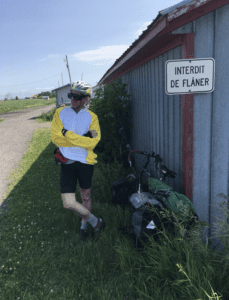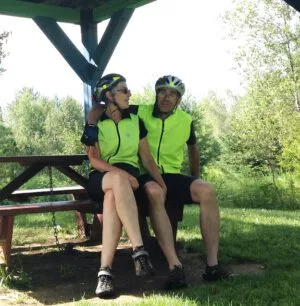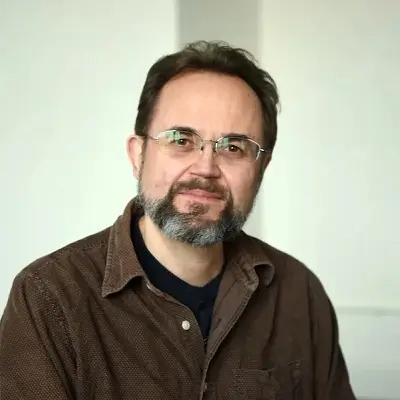How Alice Flexes her Brain Through French film
Imagine biking around the Quebec countryside and being able to chat with the shop owners thanks to your French film classes.
Long-time ILI World Language student and friend of the school Alice Armen recently sat down on Zoom with Chris Elliott to chat about how to learn French and Spanish at ILI. Alice teaches gardening in the Farm and Food Systems program at Greenfield Community College, and her husband Ted is a machinist. She and her husband have a small farm with goats in Montague Center. Currently Alice and Ted take Advanced French Film with . Here are excerpts of their conversation, edited for clarity.
Check out Alice’s story as she touches on the power of learning French and Spanish through film, the aspect of French she found most challenging, and what makes a great language class.
Could you just tell us a bit about yourself and your experience learning French, Spanish, and other languages.
I studied Russian in middle school, but unfortunately switched schools so I had to drop it, but I loved it. My grandfather spoke Russian. He was really excited about that and got me books and everything. And when I got to college, I studied French. And then I totally dropped it when I left because I couldn’t find a way to use it in the US.
After college, I worked in the South Bronx in a literacy school for adults who had never learned to read and write. We used a lot of the same methods that ILI uses in terms of the methodology and the philosophy. At the time, the whole thrust for literacy was tutorials, but a whole movement was brewing in Latin America to teach people based on the work of Brasilia n educator Paulo Freire. It was classroom based. People talked about their problems and wrote about their lives as a catalyst for their learning. Since then, I’ve just been doing a whole bunch of different things, but I’ve been living here and raising a family for over 30 years, and I’ve been at ILI for a long time.
n educator Paulo Freire. It was classroom based. People talked about their problems and wrote about their lives as a catalyst for their learning. Since then, I’ve just been doing a whole bunch of different things, but I’ve been living here and raising a family for over 30 years, and I’ve been at ILI for a long time.
How long have you been taking French or other language classes at ILI?
I think I started in the fall of 2007 with Spanish, and pretty much have been taking classes ever since. Which is why I wanted to do the talk with you just because I feel a lot of gratitude.
I started doing Spanish, intermediate and advanced with Daniel Cuenca [Former ILI Spanish and Portuguese instructor and current Assistant Professor of Spanish and Portuguese at Northeastern University and Assistant Spanish Program Coordinator at Boston College] and he was just wonderful. His methodology was just so interesting and helpful. The idea that ILI promotes, which is really different from a lot of language schools, this idea that you really have to catch the interest of the student in your curriculum development. Language imparts meaning because it’s language–it’s communication. And Daniel was such a gifted teacher. He put so much work into his classes.
In 2016 my husband and I were planning a bicycle trip in France, and my husband started taking classes with Sabine. And he kept saying, Oh, she’s just really good. We’ve been going on bicycle trips in the summer in Canada and Quebec, and I realized that I hadn’t lost much French at all. I could understand and communicate with people.
 Quebec is really fascinating, the way that the English and the French is so fraught, because they have this thing where English people don’t speak French and French people don’t speak English. And where we are doing all the bicycle touring, it’s in the countryside. People don’t speak English at all. And if you start talking with them in English, they just look panic stricken. Basically, it’s like they start conjugating verbs in their head or something. So that got me really inspired and made me realize like, Oh, yeah, maybe I should go back into French.
Quebec is really fascinating, the way that the English and the French is so fraught, because they have this thing where English people don’t speak French and French people don’t speak English. And where we are doing all the bicycle touring, it’s in the countryside. People don’t speak English at all. And if you start talking with them in English, they just look panic stricken. Basically, it’s like they start conjugating verbs in their head or something. So that got me really inspired and made me realize like, Oh, yeah, maybe I should go back into French.
When we got back from France, I started taking French classes with Sabine, and it’s so much fun. She’s just a wonderful teacher—so knowledgeable and gifted Ted has been taking classes ever since. And he’s progressing by leaps and bounds.
I’ve realized that the way to teach upper level language is through films. Every single country has their films, and they all have different slang and different accents. Many films are made from books. Sabine was totally the right person because she knows a lot about French film and she loves it. And so we have sort of like a French “cine-club” (film club).
Sabine’s found a lot of the screenplays. We can read and talk. And the cool thing about reading a book and watching a film is that there’s always interpretation. There’s this huge reservoir of films, both in the French and the Spanish world.
Did you learn Spanish or French online or face to face? Which did you prefer?
When the pandemic hit, we did all of our French film classes online. And I thought I was going to hate them. But they’ve actually been great. And we’re not going to meet in person for a while now. The Zoom thing actually lends itself quite well to the film classes, but I do prefer face to face learning.
What do you think made the online classes work so well to learn French?
First of all, the desperation of the pandemic and needing to have something to do was part of it. But I think that because Sabine became very adept at playing a clip of the movie and then talking about it. It’s actually pretty good because there have been some new students. There was one from Long Island. There’s one from a town in upstate New York.
I think the biggest takeaway from this French film class is the multi sensory aspect of it. If you’re watching a movie in French, you are also watching the subtitles in French. It’s very multi sensory. I feel like the bottom line, at least for my purposes, for my husband too, is just having the mental stimulation.
And it’s helped me. I went through a really difficult period when we had teenagers, and the language thing really helped me a lot. When I was driving my son to school, one way I would listen to the news in French and on the way back, I’d listen to it in Spanish.
What aspects of learning French or Spanish did you struggle with the most?
It’s not grammar, it’s spelling in French. Because in French, a lot of the spelling is like when the pedal meets the metal, where you can tell if a person knows what grammar form they’re supposed to be using or not. And stuff like that in Spanish is actually more complicated because they use more grammar forms, but French is harder to spell because many verb forms sound the same in the spoken language but they are not at all the same. Comprehension is very easy for me at this point.
How long did you need to speak French fluently?
I don’t know. I don’t even know where I am with that. It seems to me if you can, watch French films, read, and talk. I don’t know how long it takes, and I also think each person is different.
But it has to do with how much you’re reading, how much you’re listening. I listen to the Quebec station in the car every time I drive. So for me, it’s like a brain exercise. It’s like that kind of thing where you need 1000 hours to do something well. If you read books, that really helps with knowing the structure of the language.
Have you ever had to put into practice your Spanish speaking skills in the US? Or abroad?
Oh, yeah, lots of times. I put it into practice all the time.
I had all this stuff that was my mother’s that I wanted to get rid of. I went to the Survival Center, and it turned out there was a Spanish speaking person who didn’t speak any English at all. She was setting up two households for relatives coming from the Dominican Republic. It’s exciting to me when I find people that need help.
It’s like those fascinating linguistic situations in Canada, where there’s this gulf. It’s just bizarre, because there are so many people that speak French that are in an English dominant country in an English dominant continent. And same with the immigrants that do not speak any English at all that live here in our town, or in the next town.
Would you recommend others to learn Spanish or French? And why?
One of the reasons that I wanted to learn Spanish was because I wanted to have more contact with people in the Spanish speaking community. And then I started tutoring in South Deerfield with some farmworkers, three farmworkers. And one of them, she’s such a close friend of mine now.
I’m constantly telling people that ILI is such a treasure. The fact that we have a language school like this in our community is really amazing, and the fact that they are really very serious about their teaching methodologies, and they have teaching methodologies that are, even though they’re not new, they’re not really employed in most places.
Thanks for your time, Alice. It’s been fun talking to you.
The main point is that I wanted to talk to you because I just feel so grateful, what ILI has done for me and for my husband, and it’s just really great to have ILI in the community.
Learn more about taking in-person and online Spanish classes and in-person and online French classes and in-person. Follow ILI on Facebook and Instagram.
Read more about how to learn Spanish, French, and other languages:
- Top 7 reasons to learn and speak Spanish fluently in the USA.
- 5 tips on how to efficiently learn German from home
- The best ways to learn Spanish online and why it matters in 2021
- Improve your listening skills in 4 easy steps!
- Kathy Learning Spanish (again): Interview with a Spanish language student living in the USA
- Darlene Tells Her Story: An Interview with Darlene, a Spanish language student living in the USA
- How French Classes Changed Rebecca’s Life
- A guide for beginners on how to learn Spanish
- 4 Great Reasons Why You Should Learn Spanish in the USA
